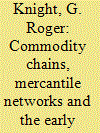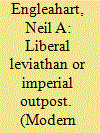| Srl | Item |
| 1 |
ID:
130577


|
|
|
|
|
| Publication |
2014.
|
| Summary/Abstract |
This paper discusses the foundational history of a major European mercantile house in colonial South East Asia in the context of commercial developments that had both a regional and global reach. In so doing, it seeks to relate a local and historically particular event to a broader world pattern defined by three rapidly evolving commodity chains, based respectively on the production, distribution and consumption of cotton goods, coffee and opium. In this context, the paper argues that the hard-won commercial success of the firm in question resulted from a significant degree of withdrawal from the bilateral ties between colony and metropolis inherent in the cotton and coffee commodity chains. In their place, the firm had recourse to several varieties of the inter-Asian trade, of which the opium commodity chain constituted the key dimension.
|
|
|
|
|
|
|
|
|
|
|
|
|
|
|
|
| 2 |
ID:
105288


|
|
|
|
|
| Publication |
2011.
|
| Summary/Abstract |
This paper examines the growth of the British commercial communities in the Straits Settlements in the first half of the nineteenth century. It describes how they emerged as a coherent commercial and political interest group, separate from the Indian empire, with their own network of allies and commercial partners in Britain. As such, the Straits merchants emerged as a significant political lobby in their own right. It contends that in the process, they revived earlier notions of Southeast Asia as a discrete geographical region, in which political and ethnic diversity was bridged by the flourishing of maritime commercial networks.
|
|
|
|
|
|
|
|
|
|
|
|
|
|
|
|
| 3 |
ID:
105283


|
|
|
|
|
| Publication |
2011.
|
| Summary/Abstract |
J. S. Furnivall, in his influential account of the impact of British rule in Burma 1824-1948, argues that British officials laid down a Liberal administration that exposed the colony to market forces, monetized the economy and devastated communities. However, there is little evidence that British administrators actually thought in Liberal terms: they relied heavily on institutions inherited from the Burmese monarchy, and when they introduced new administrative methods these were drawn from other parts of British India and only indirectly influenced by Liberalism. Furnivall's view of the ideological origins of British administration, in turn, distorts his reading of the impact of British rule, as illustrated by recent work on the pre-colonial economy showing that it was in fact more monetized and commercialized than he claims. If his account of the pre-modern economy is not viable, Furnivall's claims about the impact of British colonialism in Burma demand re-evaluation.
|
|
|
|
|
|
|
|
|
|
|
|
|
|
|
|
| 4 |
ID:
081253


|
|
|
|
|
| Publication |
London, Macmillan, 1989.
|
| Description |
xxv, 489p.pbk
|
| Series |
Cambridge Commonwealth Series
|
| Standard Number |
033343806X
|
|
|
|
|
|
|
|
|
|
|
|
Copies: C:1/I:0,R:0,Q:0
Circulation
| Accession# | Call# | Current Location | Status | Policy | Location |
| 039695 | 954.035/SAR 039695 | Main | On Shelf | General | |
|
|
|
|